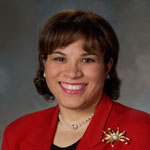Gaela Gehring Flores combines her love of language with her passion for law as an international litigator at Arnold & Porter LLP
In the 1970s, most kids spent their summers outside, swimming at the public pool, or riding their bikes in search of an ice cream truck. Not Gaela Gehring Flores. While other kids spent their summer vacations in backyards and on beaches, she spent hers learning Spanish at Bradley University in Peoria, Illinois, an hour outside her rural home.
“From age five on, I was in Spanish-immersion school in the summer,” says Gehring Flores, whose mother is first-generation Mexican-American. “Interestingly enough, my mom doesn’t speak that much Spanish. When she was growing up, the most important thing was assimilating. Even though her parents could have taught her Spanish, they decided it was against her best interests—reasonably so at the time. So, when she saw from a very young age that I had an interest in Spanish, it touched her quite a bit.”
Every day each summer, her mother drove Gehring Flores an hour each way to Spanish-immersion school. And when she couldn’t, Gehring Flores took the bus. “For most kids, that would have been the pinnacle of drudgery,” says Gehring Flores, now a partner at Arnold & Porter LLP, a Washington, DC-based law firm. “But for me, it was an exciting opportunity.”
Where her linguistic interests come from is a mystery. “For some reason, I had this huge drive to learn Spanish, even though there weren’t a lot of people in my town who knew Spanish, or even remotely supported the idea of being bilingual,” Gehring Flores continues.
She felt the same drive to become a lawyer, declaring it her chosen profession at age 12. “I told my mother at the very ripe age of five that I was going to be president. I downgraded a bit from there and decided that I wanted to be a lawyer,” Gehring Flores says. She studied political science and international relations at the University of Illinois at Champaign-Urbana, after which she got her law degree at Georgetown University. “I’m not sure where I got the idea to become a lawyer; call it divine intervention.”
“Divine intervention” is a good way to put it, as Gehring Flores found her calling instinctually, almost as a matter of fate. “My dream manifested itself relatively early on,” she says. “I didn’t just want to be a lawyer; I wanted to be able to use my language skills and my familiarity with Latin American culture to one day help others.”
Unfortunately, professors told her that her dream job didn’t exist. “I wanted my linguistic and cultural background to be part of who I was as a lawyer,” Gehring Flores says, “but my professors and mentors warned me that a lot of lawyers with language skills are reduced to being glorified translators.”
Initially, those same professors encouraged Gehring Flores to pursue a career in corporate or transactional law, which is the type of law that most attorneys with language skills practice, flexing their linguistic skills in pursuit of transnational business deals. “Early on in law school, however, I learned that I really liked the litigation aspect of the law more than the corporate or transactional aspects of the law,” Gehring Flores says. “I really enjoyed written and oral advocacy, so my mentors and professors who were with me at that time encouraged me to focus on litigation.”
Gehring Flores therefore persisted with her goals, ultimately pursuing a career in international litigation at the firm Paul, Weiss, Rifkind, Wharton & Garrison. “Paul Weiss was and still is known for its very prestigious and very robust international litigation practice,” says Gehring Flores, who practiced at Paul Weiss until she was a sixth year associate. “I thought, ‘I’m going to go to a law firm that has a really dynamic international litigation practice and see if I can build something there that fits with my vision.’”
At Paul Weiss, Gehring Flores discovered a new legal passion—commercial international arbitration—when she represented the Japanese engineering firm Mitsubishi Heavy Industries in a trade secrets case against an Italian competitor, appearing before the International Chamber of Commerce (ICC) International Court of Arbitration. Because she loved it so much, she revised her dream appropriately. “I wanted someday to work on arbitration that somehow involved Latin America,” she says.
That day came in 2002, when Gehring Flores was offered a job as an associate at the law firm White & Case, which was establishing a Latin American branch of its international investment arbitration practice. “It was my dream job,” says Gehring Flores, who has been at Arnold & Porter since 2007, representing sovereign nations around the world in international investment disputes brought against them by foreign investors, as allowed by thousands of bilateral international investment treaties. “The type of arbitration I do involves disputes regarding investments that are covered by international treaties, which give investors from the signatory countries the ability to sue if they’ve made a foreign investment in a country, and they feel that the country expropriated their investment unlawfully, discriminated against them, or otherwise treated them unfairly.”
Gehring Flores—who has represented nations such as Chile, the Dominican Republic, Guatemala, and Venezuela—attributes the success of her practice to the marriage of linguistics with law, which she knew, against all odds, would be advantageous. “Before we built our practice, our clients were happy to be represented by lawyers who didn’t speak their language or understand their culture,” she says. “But I had this vision that Spanish-language skills and experience in Latin American culture would provide clients with a particular comparative advantage, and I think I was right.”
The Global Arbitration Review thinks so, too, as it called Arnold & Porter the “large international arbitration practice that impressed the most” in 2012. “I pinch myself every day when I think of what I do,” says Gehring Flores, who also puts her legal and language expertise to work for US Latinos—something she’s done since she was an undergraduate at the University of Illinois, where she worked as a tutor to minority students, many of who were Latino. “It’s very, very important to me that I support Latinos in my community, and that I use my linguistic and cultural skills for good.”
To that end, Gehring Flores—who serves on her firm’s diversity committee and often mentors minority attorneys—frequently represents documented and undocumented immigrants pro bono in immigration cases, affording them the same opportunity she had to create and pursue a dream. “I think it’s very important to give the people in this country who are the most disenfranchised a voice,” she says. “They deserve legal standing to make themselves heard.”

